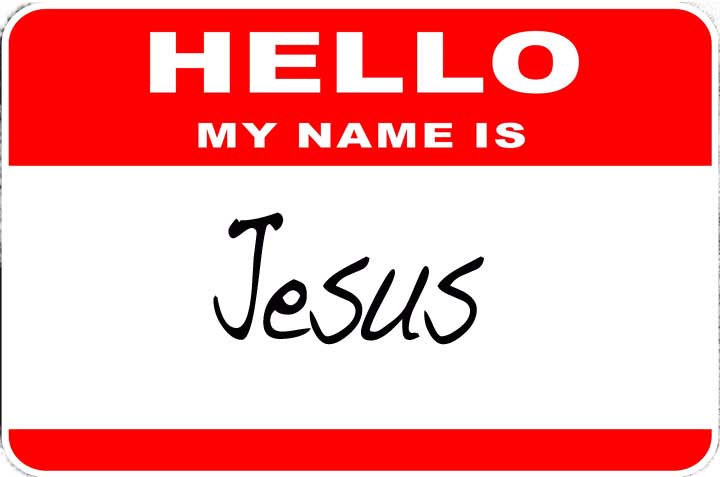Jesus Christ – What’s in a name?
Nowadays, the meaning of names are not all that important. My name Simon, for example, means “he has heard”, which is ironic seeing as I am terrible at remembering things if I only hear them. When it comes to organising our lives, my gracious wife knows my motto is, “if it’s not written on the calendar, it doesn’t exist”.
But in the ancient world, and notably in the Bible, names were vitally important. Their meaning held great significance and often a name was given as a defining and even prophetic identity. Here are some examples that may illustrate my point:
- Adam means “Man”
- Eve means “Living”
- Moses means “Deliverer”
- Ruth means “Friend”
- Elijah means “My God is Yahweh”
- Peter means “Rock”


The first thing to point out is that “Jesus Christ” is not his first and last name. His parents weren’t Mr and Mrs Christ. Surnames were not used in ancient Israel, although people were identified by their father (as in “James son of Zebedee” in Matthew 4:21) or by their home town (as in “Jesus of Nazareth” in Mark 1:24 or “Joseph of Arimathea” in John 19:38). However, the word “Christ” does not refer to either one of these.
“Pilate then went back inside the palace, summoned Jesus and asked him, “Are you the king of the Jews?â€
 “All authority in heaven and on earth has been given to me.” (Matthew 28:18). That’s kingship language.
“All authority in heaven and on earth has been given to me.” (Matthew 28:18). That’s kingship language. Christianity is by definition therefore an “exclusive” religion. There is only one way to God and Jesus is it. I have heard people claiming to be Christians, proclaiming a version of Christianity that says that we all just have our own “faith tradition” and that as we all seek unity we are all coming closer to God. It doesn’t really matter how you respond to Jesus, what matters is your sincerity or your effort or your kindness towards your fellow man.
Christianity is by definition therefore an “exclusive” religion. There is only one way to God and Jesus is it. I have heard people claiming to be Christians, proclaiming a version of Christianity that says that we all just have our own “faith tradition” and that as we all seek unity we are all coming closer to God. It doesn’t really matter how you respond to Jesus, what matters is your sincerity or your effort or your kindness towards your fellow man.This multi-faith understanding of religion and spirituality is very palatable because it is so darn nice. It welcomes everyone and tries to avoid saying that anyone is “right” or “wrong” which might offend or come across as arrogant. But although it may be nice, it’s just not Christianity. You can not say that you follow or side with Jesus Christ, if you ignore the very definition of the word “Christ”.What you have done is just make up your own religion. And if that’s what you want to do, go for it. Just please don’t call yourself a Christian. A Christian is someone who responds to Jesus as Christ – that is, as God’s king, anointed to rule over the entire Universe and over every aspect of our lives. As Abraham Kyper put it: “There is not one square inch of the entire creation about which Jesus Christ does not cry out, ‘This is mine! This belongs to me!'”Christianity has a bold and strong message that effects every person on the planet, but it is also a good message, because Jesus is a good king. His kingship brings fellowship with God and life and wholeness. His kingship is full of love and light and outside of his kingship we are lost and unprotected. As Paul writes in Colossians 1:12-14, “Give joyful thanks to the Father, who has qualified you to share in the inheritance of his holy people in the kingdom of light. For he has rescued us from the dominion of darkness and brought us into the kingdom of the Son he loves, in whom we have redemption, the forgiveness of sins.â€
If Jesus is God’s king then our correct response is to submit to his rule – to live under his direction and instruction and authority. To follow him. To become his disciple. To obey and serve and honour him with our actions and our words and our thoughts and all our resources. The reality is though, even for those who acknowledge Jesus as the Christ, we all fail daily at doing this. Our tendency is to live our own way and rule our own life. We ignore God’s authority and live as if he is not our king. Even those who try to follow Jesus as their king, know that their efforts are at times half-hearted and full of mixed and selfish motives. No one can claim to be perfect in their service and obedience to Jesus. As Paul puts it in Romans 3:23, “All have sinned and fall short of the glory of God.”
We need rescuing. We need saving. We need to be freed from our slavery to selfishness and our tendency to ignore God’s rule. We also need to be freed from the judgement of God.
Talking about things like the judgement of God and hell is not a good way to make friends. Like the idea of the kingship of Jesus, it clearly isn’t a popular concept in the whole Christian message. Some people have tried to re-create a Christianity without the idea of Hell or the judgement of God, but I think you end up with another “watered-down” false version of Christianity rather than the genuine article. I think this for 3 main reasons:
1. Judgement Day is not just the name of a Terminator movie. You can not escape the references through both the Old and New Testaments telling of one final day when all people who have ever lived having to stand before God and give an account  for our lives. God promises that all evil will be judged and only the “righteous” will be spared. Unfortunately, another consistent message throughout scripture is the fact that no one can claim to be “righteous” or innocent before God based on their own life. That is why Judgement Day is a terrifying prospect. But nevertheless, the message of the prophets, or Jesus and of the New Testament writers is clear: “God has set a day when he will judge the world with justice by the man he has appointed.” (Acts 17:31). If this is true, then to avoid or ignore this coming reality is as foolish as to stand on a beach and ignore the warnings that a tsunami is on its way. Judgment Day is real. It cannot be taken out of Christianity, and any attempt to do so, leaves some major gaping holes in the bible.
for our lives. God promises that all evil will be judged and only the “righteous” will be spared. Unfortunately, another consistent message throughout scripture is the fact that no one can claim to be “righteous” or innocent before God based on their own life. That is why Judgement Day is a terrifying prospect. But nevertheless, the message of the prophets, or Jesus and of the New Testament writers is clear: “God has set a day when he will judge the world with justice by the man he has appointed.” (Acts 17:31). If this is true, then to avoid or ignore this coming reality is as foolish as to stand on a beach and ignore the warnings that a tsunami is on its way. Judgment Day is real. It cannot be taken out of Christianity, and any attempt to do so, leaves some major gaping holes in the bible.
2. Jesus had a Hell of a Message. If you read Jesus’ words and want to heed them, you can not ignore the fact that he talks about Hell. In fact, no Old Testament prophet or New Testament preacher, is recorded as talking about Hell as much as Jesus. To simply edit those bits out and accept only parts of Jesus’ teaching is to really misrepresent him unfairly. If Jesus truly is from Heaven (as he claimed) then he has the authority on the subject of heaven and hell and whether they exist. Now the exact nature of Hell is debatable in terms of whether it is consciously eternal or not, but Jesus’ warnings are unavoidable. Hell, Jesus says, is real, and it is the destiny of all who do not accept his offer of escape.
3. No Bad News = No Good News. Sometimes people think that the Old Testament gives us a picture of an angry judging God, while the New Testament is all about love and peace. This is true to some extent in that the judgements of God are quite vivid in the Old Testament (10 plagues on Egypt for example), and in the New Testament we are introduced to the greatest expression of God’s love and the wonderful gospel message that offers peace to all the guilty. But it is a grave misunderstanding to say that the judgment of God is swept under the carpet and replaced with a nicer, loving message. The offer of peace only makes sense to a people who are at war with God. The offer of forgiveness and mercy only makes sense to a people who are guilty and under judgement. You can not show mercy to the innocent. The innocent deserve to be acquitted. It is the guilty who need mercy. The “gospel” is the message of Christianity. It literally means “Good News”. It is only in the context of the bad news of the fact that we are under God’s just judgement, that we can receive with joy and gratitude the good news of God’s solution.
 Now this all seems pretty bleak, but think of it as a diagnosis. When the doctor tells you he has done all the tests and you have cancer, you may be blown away by the bleakness of that news, but very quickly we look to what the doctor is offering as a treatment and if there is any hope. The message of the Bible and the message of Jesus is that our diagnosis is bleak. We have a cancer of the soul. Our sin means that we stand before a holy and perfect God with no way of claiming innocence and no means of “paying God back”. Any good deed we have done is simply a good deed that we should have done in the first place and so does not pay for the thoughts, words and deeds that lead us to be standing before God condemned. And although I use that language as a metaphor, it will also one day be a reality when, as Hebrews 9:27 says, “man is destined to die once and then face judgement”.
Now this all seems pretty bleak, but think of it as a diagnosis. When the doctor tells you he has done all the tests and you have cancer, you may be blown away by the bleakness of that news, but very quickly we look to what the doctor is offering as a treatment and if there is any hope. The message of the Bible and the message of Jesus is that our diagnosis is bleak. We have a cancer of the soul. Our sin means that we stand before a holy and perfect God with no way of claiming innocence and no means of “paying God back”. Any good deed we have done is simply a good deed that we should have done in the first place and so does not pay for the thoughts, words and deeds that lead us to be standing before God condemned. And although I use that language as a metaphor, it will also one day be a reality when, as Hebrews 9:27 says, “man is destined to die once and then face judgement”.
I don’t write this to make you feel bad or to scare you. In fact, hopefully hearing about the judgement of God brings some clarity to your experience. This is why you feel distant from God. This is why God seems obscured to you. This is why you may be able to work on your bad habits and behaviour but you can’t change your heart. This is why all you can do with your guilt and shame from the ways you have wronged people, is just to try to forget them or “move on”.
The judgement of God is good news. It tells us that God cares about how we treat people and how people treat us. It means God is not just a dithering old Santa Claus in the sky who gives you presents no matter what. It means God loves justice and goodness and mercy and truth and God will ensure that on the last day all the evil in the history of the world will be shown to be evil and done away with. The judgement of God means that “God is light and in him there is no darkness at all” (1 John 1:5) and in the New Creation that God will bring after the Judgement Day, there will be no more pain or sorrow caused by sin and evil. No evil dictator will “get away” with their crimes, no injustice will be left undealt with and all acts of goodness will be finally vindicated. The judgement of God is a good thing.
The problem is of course that if the judgement of God is real and truly just, then we are all screwed. We need some cure for our cancer. We need to be rescued from our bleak situation. We need a Saviour.

This is why Jesus came… and this is what “Jesus” means.
After Joseph got the news that his fiance, Mary was going to give birth and that the pregnancy had been caused by God’s Spirit (rather than her sleeping around), he was told by the Angel of the Lord, “She will give birth to a son, and you are to give him the name Jesus because he will save his people from their sins.†The name Jesus means something. It’s not just something picked out of a baby book. It is a name that God instructed Joseph that he must have because it related to his mission, “he will save his people from their sins”.
The word “Jesus” comes from “Yeshua” (commonly known today as Joshua). Yeshua is derived from two Hebrew words. The “Ye” points to God’s personal name “Yahweh” and the “Shua” points to the hebrew word for “salvation”. So Yeshua (or “Jesus”) literally means God is Salvation. This is why Jesus is called Jesus, because his mission was God’s salvation. And what do we need to be “saved” from? Well, so that we don’t start thinking that we need to be saved from ignorance or lack of motivation or global warming or political oppression, the angel makes it clear… We need to be saved from our sins.
And it is Jesus who makes that salvation possible through living a perfect life that we did not live, dying a torturous death that we should have died, bearing the judgement of God that he did not deserve, and rising back to life in victory to offer us a way of salvation that we could not earn.
God’s King has come, just as was prophesied, but he did not come to judge us all and clean up his creation. If he came to do that, he might have been called Yehoshafat, meaning “God Judges”. But no, he came to give us a way out. He came on a rescue mission. He came to provide the cure. He came to save us. And so he was named, Jesus.
What’s in a name? Everything.
Jesus Christ means Saviour King. “Jesus” speaks of his mission. “Christ” speaks of his role. If you like pictures, think of it as two rings. One ring is a life preserver, the other ring is a crown. Jesus Christ is both.
If you are exploring Christianity, make sure you at least understand the basics. Don’t fall for counterfeits, even if they offer a more palatable Christianity. If you accept or reject Christianity, at least accept or reject the real deal.
So, if you want to get your head around what real Christianity is, I think you don’t really need to look much further than the name “Jesus Christ”. It tells us who Jesus is and what he was on about. It tells us why he came and what he offers.
Or maybe you’re someone who has, possibly for many years, called yourself a Christian, but you now realise that you haven’t really been one all along. Well, the name “Jesus Christ” also tells us us how we are to respond to him. Not simply as a wise teacher, or a good example to follow. We must respond to who he really is. Our rightful king and our only hope for salvation.
“It is by the name of Jesus Christ of Nazareth,
whom you crucified but whom God raised from the dead,
that this man stands before you healed.
He is the stone you builders rejected, which has become the capstone.
Salvation is found in no one else,
for there is no other name under heaven given to men by which we must be saved.â€
Acts 4:10-12
“These are written
that you may believe that Jesus is the Christ, the Son of God,
and that by believing you may have life in his name”
John 20:31
(4040)



